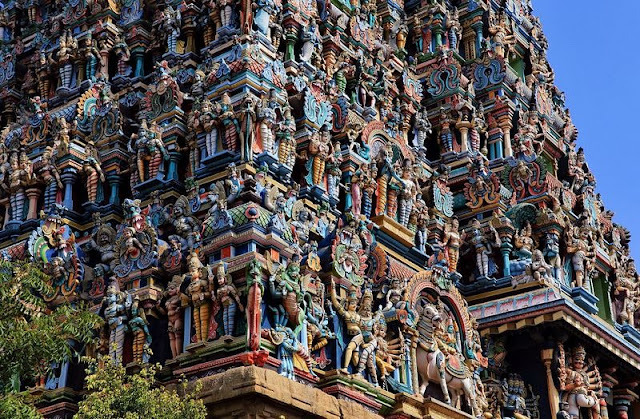Located in the heart of the 2,500-years-old city, Meenakshi Temple is dedicated to goddess Meenakshi, an avatar of the Hindu goddess Parvati — the consort of Lord Shiva. It has long been the focus of both Indian and international tourist attraction as well as one of the most important places of Hindu pilgrimage. For the people of Madurai, the temple is the very center of their cultural and religious life.
Meenakshi Temple was originally built by Kulasekarer Pandya in the 6th century BC, but the credit for the present look of the temple goes to the Nayakas, who ruled Madurai from 16th to 18th century. The reign of the Nayaks marks the golden period of Madurai when art, architecture and learning flourished expansively. The riot of colors, however, is a more recent addition.
The temple complex covers around 45 acres and is surrounded by 12 gateway towers called gopurams, the tallest of which is the famous southern tower that rises to 52 meters. Each gopuram is a multi-storied structure in the shape of a steep pyramid, covered with thousands of stone figures of animals, gods, goddesses and demons painted in all colors of the rainbow.
There are several shrines inside the complex dedicated to goddess Meenakshi, her consort Lord Shiva (also called Sundareswarar) and their son, the elephant god Ganesha. Both the Meenakshi and Sundareswarar shrines have gold plated towers whose tops can be seen from a great distance. There is also a sacred water tank, several halls and innumerable Mandapas. Scattered throughout the complex are staggering number of sculptures and statues of gods, warriors on horses, battle scenes, and even characters from the mighty Indian epic Mahabharata. There are an estimated 33,000 sculptures all over the temple.
The temple wasn’t always so vividly painted. The original structure was probably unpainted granite. Then people started painting the sculptures because they wanted the temple to look colorful during big events and festivals. Although it’s pretty to look at, the mindless renovations over the years have deposited thick layers of enamel paint and cement over the ancient structures, hiding the beauty of the original stone sculptures which lay underneath.
Thankfully, for the last few decades there has been a growing awareness on the need to preserve the original beauty of the temple. Several restoration work had taken place in recent years with the intention of restoring the centuries-old Meenakshi Temple to its original state.
Sources: Wikipedia / India.gov.in / The Hindu



























Post A Comment: